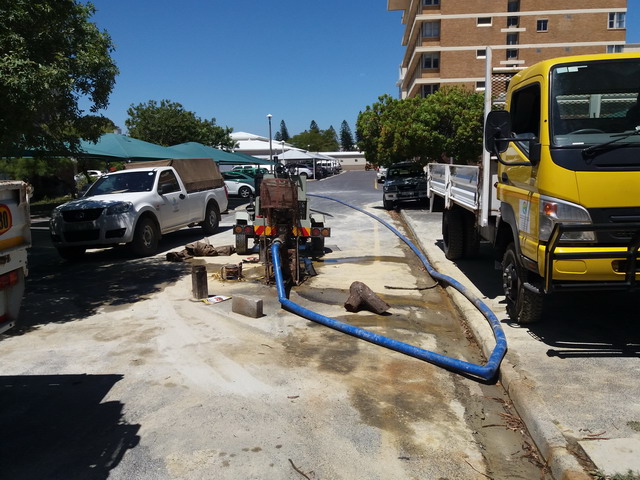
News
Mitigating the risk of water-related disruptions to service delivery
The Western Cape Government (WCG) has taken decisive steps to mitigate the risk and potential impact of drought-related municipal water supply disruptions on its essential service delivery activities, to supplement the water supply at critical WCG service delivery sites, and to reduce the WCG’s overall water consumption. The efforts of all WCG departments and entities are being coordinated through a water business continuity plan (BCP) task team led by Gavin Kode, Department of Transport and Public Works (DTPW) Deputy Director-General: Provincial Public Works.
The first phase of emergency groundwater drilling for supplementary water supplies at critical facilities commenced on 6 November 2017, and sufficient ground water has already been secured at 9 of the 26 identified essential service delivery facilities in the first phase. These sites include certain provincial hospitals, Department of Social Development Child and Youth Care Centres, and various head office management facilities. The process of confirming water yields and quality testing as well designing treatment and reticulation plans is also well advanced. Phase 1 work also includes some facilities that already have boreholes but which require more boreholes or necessary additional engineering work. Phase 2 will mostly focus on securing water supplies for further health facilities.
The WCG Water BCP task team that was established in September 2017 meets every two weeks. Its key objective is to establish how and which service delivery requirements of the WCG can continue to be met when there is constrained or no municipal water in a geographic area i.e. dry taps. A related objective is to ensure that the WCG does everything it can to reduce its water consumption to help avoid a “dry taps”, “Day Zero” scenario anywhere in the Western Cape.
The WCG Water BCP comprises a package of interventions at various time scales, from the immediate to the long term: demand-side interventions to reduce water consumption and improve water efficiency, as well as supply-side interventions to secure independent water supply required for certain identified and prioritised high-risk facilities and services. These interventions will help reduce the consumption of municipal water to free up supplies for other users, and help ensure that there is enough water at key WCG facilities for operational, drinking, hygiene, and fire safety purposes.
Emergency supply-side interventions to secure water supplies at critical service delivery sites has been made possible by the establishment of a DTPW emergency framework for the packages of necessary services, namely, geohydrology, drilling, yield testing, quality testing, equipping, treatment, storage and reticulation services. Funding for all the initiatives (both demand- and supply-side interventions) has been secured from existing funded programmes/projects, expansion of existing programmes/projects, reprioritisation of funding of existing funded programmes/projects and, in some instances, from budget reallocations.
Progress towards maintaining essential services in the face of the most serious drought in living memory has been made possible by team work in the WCG. In particular, DTPW, the Provincial Treasury, the WCG Department of Health and the Western Cape Education Department have pulled together to ensure that WCG’s water programmes and projects are funded, designed, procured and implemented successfully.
Byron la Hoe
Communication Officer
Department of Transport and Public Works
Tel: 021 483 9813
Cell: 079 281 8570
Email: byron.lahoe@westerncape.gov.za


